You all are savvy digital marketers here. You use Moz, Ahrefs, and others for better SEO and link building. Google's every word sets your hearts aflutter, and you scour trends as well as analyze competitors to optimize websites and content for skyrocket results. So do I, a humble guest blogger trying to create copy readers would give a damn about. And while Tim Soula said that guest posts ROI wasn’t that good, my profit here went beyond traffic:
Sure, link building is due in no small part, either. Yet, it's a logical consequence of the above moves.
Here's a tiny part of my published guest content:
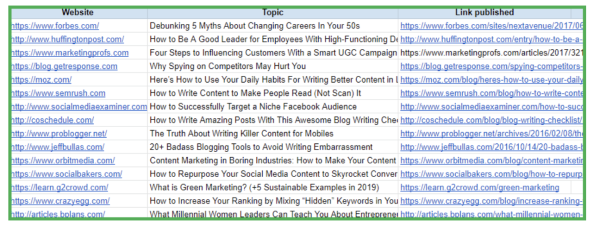
Okay, it might seem unimpressive for some. But for a girl who started her way as an SEO writer for a project both Google and webmasters consider a bit tricky, it's worth something. Especially when no one except websites with DA wanted to publish her articles, and most editors recommended to give up writing because her English was "lame" and "blatant."
It was the case when Aaron's #LetsGetRejected worked. And it was the case when competitors helped me meet my bullish targets unwillingly and unconsciously.
How?
Their lying SEO and content strategy worked for me.
What do I mean by “lying?”
It all started way back in 2014 after this post of mine went viral. It still is, actually, waiting for the update:

And that's what I saw at competitors' websites soon after. It seems they didn't sweat it:
The next engaging article of mine shared the same destiny:

Yes, we all spy on competitors and "steal" their backlinks. But what about stealing their content, in the truest sense of the word? Isn't the purpose of link building campaigns to overtake competitors rather than copy them?
I've changed the perspective:
I stopped spying to follow in their footsteps. I started analyzing the plethora of their published guest posts for content created, not backlinks inserted. But it appeared that their tricks to win editors' favor were far from fairy, too.
What they did
Some seemed stuck in 2008: they didn't pay attention to content marketing but concentrated on out-of-date SEO tricks to build links with envious persistence:
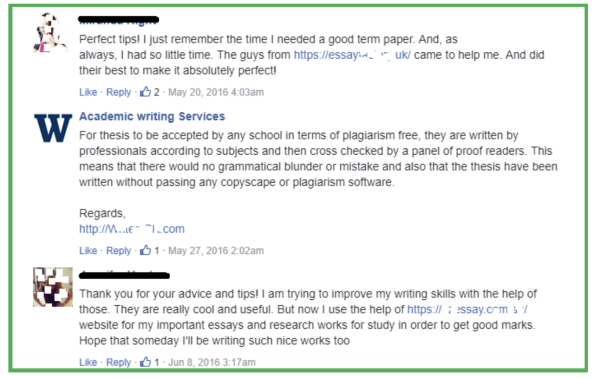
Google penalties couldn't convince them to change a strategy.
Others used guest blogging for backlinks but believed it was okay to publish posts like this one:
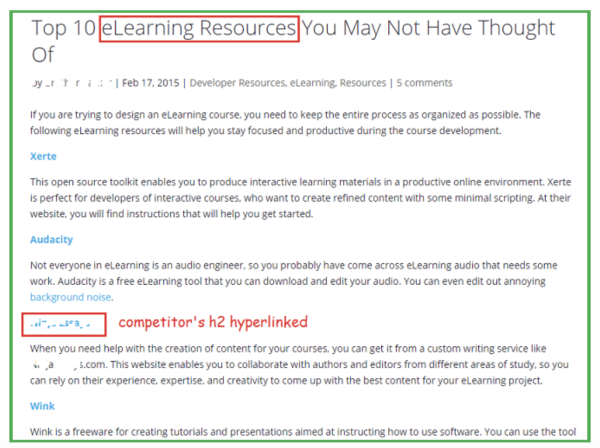
Such content of theirs gave a go-ahead for my anger that I turned into articles about Zen content marketing or "stealing" content from others. In other words, my strong sense of disappointment — while I struggled for compelling content, top blogs approved irrelevant and lousy guest posts from others — helped to see it: I needed to follow my strategy of "play double or nothing."
Let's face it:
Most of the competitors in my niche didn't care about the inside of their texts. “Top 10 Best Tools” seemed the mantra they incanted with head held high and changed nothing but a part of the title to hit the target.
Backlinking from H2 and presenting their websites under the guise of useful tools, they even had the smarts to include three-four backlinks to their services within one guest post.
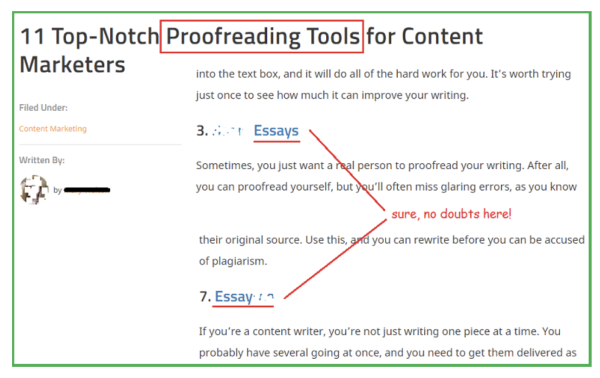
Among their biggest fails also were backlinks to commercial landing pages, using keyword rich anchors and pretending them to be educational apps:
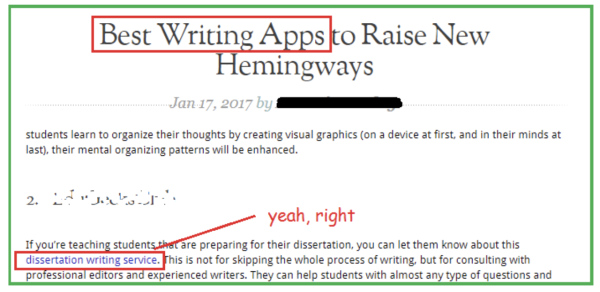
Needless to say, Google has kicked them off by now.
How it helped me
Well, first of all, they failed. Evil laugh here, sorry
But seriously though, such link building strategies don't work around long. And all link explorers have a way with words, demonstrating what happens to websites trying to outwit search engines and readers.
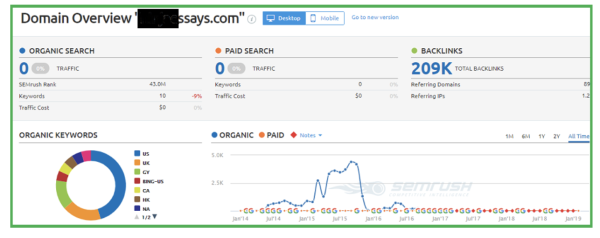
Google search queries speak volumes, too.
When I search for new guest posts published by competitors after penalties and use queries like “Author name” + “guest post” or Google’s reverse image search, I see no old friends there. New authors come to the niche, trying to wipe the slate clean and (finally!), move the needle, and use guest blogging as a white hat link building tactic.
And while they gather energies and get through five stages of grief, I continue guest blogging for big dogs thanks to the lessons I've learned:
- Don't outreach blogs with wishy-washy content even if all competitors did it and succeeded.
First, there's no surety they will accept your balderdash.
And second, are you sure you need it in your portfolio afterward? Published works are about your writing skills and reputation, so it's logical to consider their quality and value.
Your poor content is #1 reason why bloggers don't want you. Tor Refsland confirms:
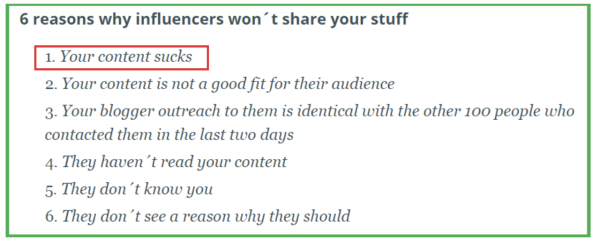
What I did to make big dogs want to see what I had:
While competitors used self-same templates to outreach bloggers, my tactic was to tell them what they wanted to hear: appeal to their pragmatism, kill their skepticism, and awaken their curiosity.
How?
By writing something they don't expect and using power words in subject lines as well as email bodies.
Suggested by Aaron Orendorff and Mike Hanski, such words make people feel a certain way, appeal to basic human instincts, and, therefore, hook bloggers.
Offering meaty content ideas, you have more chances to get noticed regardless of a niche. It goes without saying, a final draft of your proposed content should be as meaty as its idea itself.
The result won't take long in coming:

Yes, they didn't promise to publish this post but the chance they gave was worth a try.
- Don't write articles on topics your competitors cover.
I don't want to say you can't write about tools if your competitors (like mine!) create "Top 5/10/15 Tools/Apps/Resources for Blogger/Publishers/Marketers" only. Especially when studies say lists and numbers rock, most choose this content type because of its broad relevance, and some approve it for whatever quality.
The point I'm trying to bring home is you shouldn't copy competitors' approach to those topics.
Compare this list of tools:

With this or this:

The problem with my competitors' lists was they all looked the same and they all (competitors) copied the structure from one another:
1. A "Top 10 Tools/10 Best Tools for" title.2. One paragraph of introduction.3. A list of tools, written in H2 and hyperlinked.4. One-paragraph descriptions for each tool, with no details but wordiness.What could I call it if not lying? Google penalty or rankings drop for dishonesty was a sound reason here.
With all that, I've changed my understanding of originality. Writing an article, you borrow works from others one way or another: refer to sources, cite gurus, or paraphrase those who came before you. But your perspective and individual experience are what make your work original.
I needed to write blog posts that would sparkle. While competitors copied already-published ideas and did nothing to make them original, I used the oldy-worldly Skyscraper Technique saying:
“Take a topic worth "stealing" and improve it.
It's not a one-size-fits-all solution (RA), but it has helped to move the needle in my case.
How to find worthy topics? Search Google to see what's hot or try tools like Ahrefs, Buzzsumo, or MOZ's Open Site Explorer to identify the most linked articles.
How to improve worthy topics? Make them longer, update the information, expound it, or display it in different ways.
A few tips to "steal" for pitch-perfect writing:
- Never follow your competitor's writing style.
Observing the skyrocket flow of the poorly written articles' publications from competitors, I fought the temptation of following their writing style.
Indeed, who needs a savvy feel for the language when passive voice and adverbs knowledge are enough to hit the target and see your below-average works live and backlinked! (Sorry, Stephen King)
But the truth is, once you've found own writing voice and developed it, your chances of creating top-notch articles and getting them published raising to a great extent.
Why do you need a writing voice?

Yes, in-guest blogging you follow guidelines, write for a specific audience, and share the content they need. But it’s your work, so you deserve the credit.
It appears to be the only sustainable way to write; otherwise, you'll eventually burn out.
To get heard, you can't re-write and copy others all the time or raise your voice. Instead, you need to set yourself apart and show the audience that you have something special to say.
- Don't spy competitors to steal their donors.
Instead, spy to see what they do and… turn on its ear.
All backlinks come to he who writes for reasons other than link building. Sounds bombastic, but that’s exactly what has been working for me since I entered the digital marketing world in 2013.
I never considered guest blogging a strategy to build links. (Though I backlinked to my content, of course.) And I never spied competitors to see where they published articles. I spied them to see the quality of those articles and improve my writing skills to overtake them.
Their posts were for links, not content and exposure: poorly re-written articles, randomly outreached, and overloaded with keywords to get the most out of SEO, they encouraged me to search for alternatives.
It was the time to choose the side, so I had learned the evolution of guest blogging and chosen the bright one:
It still works for me.
Last but not least:
Even if your niche seems boring or contentious, it can provide with content everyone will be happy to share. So happened to the blog I worked with: generating evergreen and informative posts, they gave me an opportunity to build relevant links rather than hide them from editors.
So once it's decided to use guest blogging for link building, make sure you have compelling content on your website to refer readers to.
P.S. After I published the guest post on MOZ, I got a message from the competitor asking: "Hey, I noticed your post for Moz. I want to write for Moz too one day. How did you achieve this?"
Guys, it couldn’t be any easier:
Turn on Eye of the Tiger in your headphones - and go on! Start small, aim high! :)
Lesley Vos is a ghost hiding behind posts on writing craft, content marketing, and self-development. She creates web texts and polishes her writing skills. Specializing in content creation and self-criticism, Lesley develops a habit of doing her best proofreading before she hits "send." Check out Twitter to see more works of hers.


